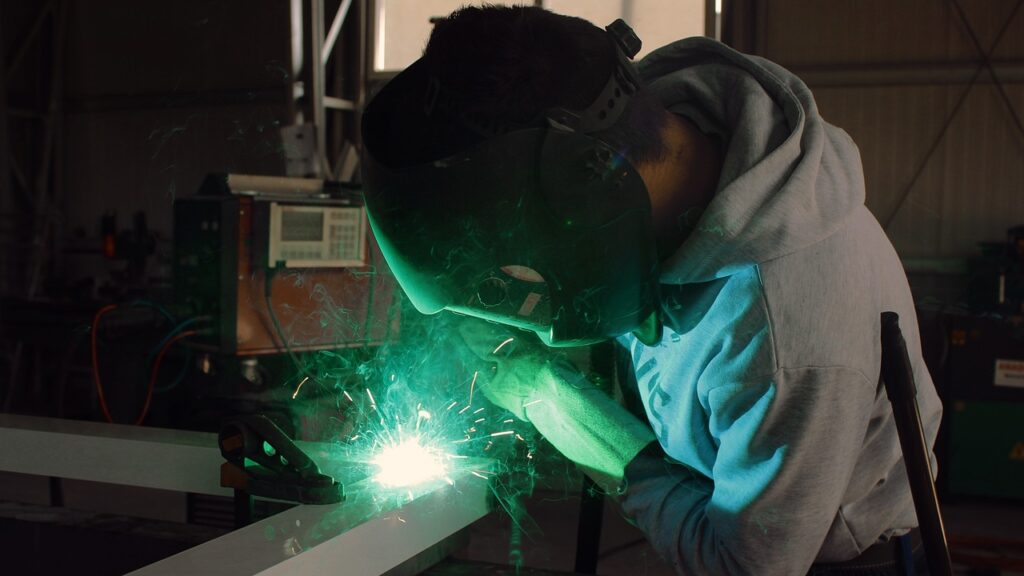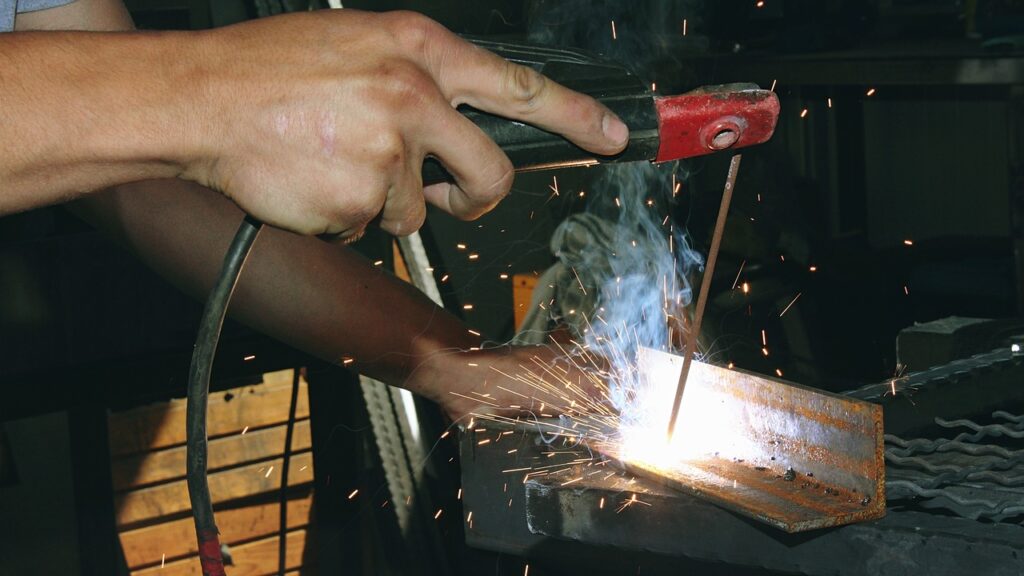Welding is an important trade career within the basic industries field, playing a crucial role in the creation and maintenance of countless structures and products. Welders join metal pieces together using heat, making them indispensable in industries such as construction, automotive, aerospace, and manufacturing. With the ongoing demand for skilled welders, job growth and salary potential remains promising, although the industry may be a little slow to grow over the next few years.
The importance of welders cannot be overstated, as they are responsible for the integrity of critical infrastructure such as bridges, pipelines, and buildings. Additionally, welders contribute to the production of essential products like vehicles, aircraft, and machinery. As industries evolve and innovate, welders will remain central to their success.
As a welder, your career prospects are diverse, offering opportunities for growth and specialization. A combination of technical expertise, physical abilities, and soft skills will enable you to succeed in this rewarding profession. The following sections will guide you through the steps to become a welder and help you reach your welding career goals.
Education and Training Requirements for Welders
A solid foundation in education and training is essential for success in your welding career. Here are the key requirements:
High School Diploma or GED
Most employers require welders to have at least a high school diploma or a General Education Development (GED) certificate. This is the starting point for pursuing further education and training in welding.
Vocational or Technical School Programs
Many aspiring welders enroll in vocational school or technical school programs to learn the skills required for the job. Types of welding programs offered at these schools include certificate, diploma, and associate degree programs, focusing on different welding techniques and methods.
As for the time to complete the program and the cost, it depends on the program. Completion can take anywhere from a few months to two years. Costs can vary, but financial aid and scholarships are often available. For additional questions you might consider, we have a list of important trade school questions.
Apprenticeships
Apprenticeships offer hands-on training and a chance to learn from experienced professionals. They include:
- Benefits of apprenticeships: Apprentices earn a wage while they learn, gaining invaluable practical experience and skills that translate directly to the workplace.
- How to find and apply for apprenticeships: Many trade unions, employers, and vocational schools offer apprenticeship programs. Search online and reach out to local organizations to find opportunities near you.
Additional Certifications
Certifications can further enhance your skills and employability as a welder. Some of the most important welding certifications include:
- American Welding Society (AWS) certifications: AWS offers various levels of certification for welders, inspectors, and supervisors, demonstrating your expertise in the field.
- Industry-specific certifications: Depending on the industry you wish to work in, additional certifications may be required or beneficial. These can include underwater welding certifications, pipeline welding certifications, or specific material welding certifications.
Essential Skills and Qualities for Welders

Successful welders possess physical abilities, technical skills, and soft skills. These qualities ensure efficiency, precision, and safety in the workplace.
Physical Abilities
Welding is a physically demanding job and it requires some of the following physical skills:
- Hand-eye coordination: The ability to precisely control the welding torch is crucial to producing quality work.
- Manual dexterity: Welders must be able to handle tools and materials with agility and finesse.
- Stamina: Welding often involves long hours of standing, bending, and lifting heavy materials. Physical endurance is key.
Technical Skills
Welders must have a strong grasp of technical concepts and processes that include some of the following:
- Reading blueprints: Interpreting design plans and following instructions accurately is vital to ensuring the structural integrity of the final product.
- Understanding welding techniques and methods: Welders must be well-versed in various welding processes, including shielded metal arc welding (SMAW), gas metal arc welding (GMAW), and gas tungsten arc welding (GTAW), among others.
Soft Skills
In addition to technical skills, welding professionals should have certain soft skills to excel in their welding career that include:
- Attention to detail: A keen eye for precision ensures the quality and safety of welded structures and components.
- Problem-solving: The ability to identify and address welding issues quickly and efficiently is crucial for maintaining productivity and meeting deadlines.
- Communication and teamwork: Welders often work in teams and must be able to effectively communicate with colleagues, supervisors, and clients to ensure a smooth workflow.
Job Opportunities and Career Growth
A career in welding offers a range of job opportunities and the potential for career growth. From entry-level positions to specialized roles, there is a path for everyone.
Entry-Level Positions
Newly trained welders typically start in entry-level positions, such as welder helpers or apprentices. These roles allow you to gain experience, refine your skills, and build a solid foundation for future growth.
Industries Employing Welders
Welders are in demand across various industries, including:
- Manufacturing and construction: Welders are essential in the fabrication of buildings, bridges, and other structures.
- Automotive and aerospace: The production and maintenance of vehicles and aircraft require skilled welders.
- Energy and infrastructure: Welders play a vital role in the development and upkeep of pipelines, power plants, and renewable energy systems.
Opportunities for Advancement
As you gain experience and expertise, you can pursue more advanced roles in your welding career:
- Specialized welding positions: With additional training and certification, you can become a specialist in areas such as underwater welding, pipeline welding, or robotic welding.
- Supervisory and management roles: As a welding supervisor or manager, you can oversee projects, manage teams, and coordinate operations.
- Self-employment and entrepreneurship: Starting your own welding business or working as a freelance welder allows you to set your schedule, choose your clients, and potentially earn a higher income.
Tips for Success for a Career in Welding

To thrive in a career as a Welder, consider the following tips for success:
Networking and Professional Organizations
Connecting with fellow welders and industry professionals can lead to valuable opportunities, knowledge, and support. Consider joining:
- American Welding Society (AWS): As a member, you gain access to resources, networking events, and industry updates.
- Local welding associations and groups: Joining regional organizations allows you to connect with professionals in your area, attend workshops, and stay informed about local opportunities.
Staying Updated on Industry Trends and Technologies
The welding industry is constantly evolving, with new techniques and technologies emerging. Staying informed about these advancements helps you remain competitive and adapt to changes in the field.
Pursuing Continuing Education and Certifications
Continued learning is essential for career growth in the welding profession. Pursue additional certifications, attend workshops, and participate in training programs to expand your skills, knowledge, and marketability as a welder.
Financial Aid and Scholarships for Welding Education
Pursuing a welding education can be a significant investment. Fortunately, various sources of financial aid and scholarships are available to help offset the costs.
Federal Financial Aid
The U.S. federal government offers financial aid to eligible students:
- FAFSA application process: Complete the Free Application for Federal Student Aid (FAFSA) to determine your eligibility for grants, loans, and work-study programs.
- Types of aid available: Aid can include Pell Grants, federal student loans, and campus-based programs such as Federal Work-Study and Federal Supplemental Educational Opportunity Grants (FSEOG).
Scholarships and Grants
Various organizations offer scholarships and grants for welding students:
- Welding-specific scholarships: Some scholarships are designed specifically for students pursuing welding education, such as those offered by the American Welding Society (AWS) Foundation.
- General scholarships for technical and vocational education: Other scholarships target students in trade and vocational programs, including welding. Research online databases and local organizations to find opportunities.
Employer-Sponsored Training and Education Programs
Some employers provide financial assistance for education and training, either through tuition reimbursement programs or partnerships with educational institutions. Check with your employer or potential employers to explore such opportunities.
Become a Welder Today
Becoming a welder involves obtaining a high school diploma or GED, pursuing specialized training through vocational programs or apprenticeships, and acquiring relevant certifications. Developing essential welding skills, staying updated on industry trends, and continuing your education are vital for success in a welding career.
As you embark on your journey to become a welder, remember that our mission is to help you navigate your education and career decisions. We are here to support and empower you every step of the way. Take advantage of the resources and opportunities available to you, and forge a path to success in your welding career.
